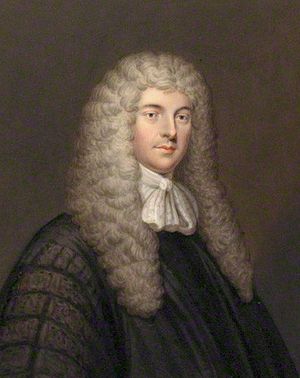3rd Parliament of William III facts for kids
The 3rd Parliament of William III was a special meeting of important people in England. King William III called for this Parliament to start on October 12, 1695. The members then gathered on November 22, 1695.
This Parliament was the first one chosen under a new law called the Triennial Act. This law said that a Parliament could only last for three years. This was a big change!
The Parliament had different groups of people. There were 257 members who were Whigs, 203 members who were Tories, and 53 others. A man named Paul Foley, who was a Whig from Hereford, became the Speaker. The Speaker is like the leader of the discussions in Parliament.
Contents
Important Meetings and Decisions
First Session: Money and Trade
The first part of this Parliament met from 1695 to 1696. The main groups, the Whigs and Tories, had trouble agreeing on two big things.
One problem was about money. People were cutting small pieces off coins, which made the money worth less. This was called "clipping." The Parliament needed to fix this. They also argued about starting a new group called the Council of Trade.
Then, there was a sudden worry that England might be invaded. This made the Whigs work together more closely. They were led by a group called the First Whig Junto. Because of this, the Whigs were able to make new laws about money. They decided to make new, proper coins. They also set up a new group called the Board of Trade. This group was chosen by the King, not by Parliament.
Second Session: A Big Trial
In the second part of the Parliament, a very important event happened. A man named Sir John Fenwick was accused of plotting against the King. He was a Jacobite, meaning he supported the old King, James II.
Parliament decided to declare him guilty without a normal trial. This was a very serious step. Fenwick tried to get out of trouble by saying other important Whigs were also part of the plot. Even though there was only one witness against him, Parliament passed the law to declare him guilty. Sir John Fenwick was executed on January 28, 1697.
Raising Money for War
During this time, England was fighting a war. The person in charge of the country's money, the Chancellor of the Exchequer, tried to find ways to pay for it.
He managed to get Parliament to agree to let the Bank of England continue its special rights until 1710. In return, the Bank gave the government a large loan of £5 million. However, he was not able to get Parliament to agree to new taxes on wine and cloth.
Third Session: Ending the War
The third and last part of this Parliament began in December 1697. By this time, a big war in Europe, called the Nine Years War, had ended. It ended with a peace agreement called the Treaty of Ryswick.
King William III wanted to keep a large army. He thought it would stop other countries from attacking England again. But the members of Parliament disagreed. They made the King reduce the army to only 10,000 soldiers.
Important Laws Passed
This Parliament passed many important laws. Here are some of them:
- Corrupt Practices Act 1695: This law tried to make elections fairer.
- Parliamentary Elections Act 1695: This law also helped with how elections were run.
- Parliamentary Elections (Returns) Act 1695: This law was about how election results were reported.
- Plantation Trade Act 1695: This law was about trade with English colonies.
- Quakers Act 1695: This law helped people who were Quakers to make promises instead of taking oaths.
- Security of King and Government Act 1695: This law aimed to protect the King and the government.
- Treason Act 1695: This law was about serious crimes against the country.
- Administration of Justice Act 1696: This law helped make the justice system work better.
- Attainder of Sir John Fenwick Act 1696: This was the special law that declared Sir John Fenwick guilty.
- Bank of England Act 1696: This law was about the Bank of England.
- Blackwell Hall Act 1696: This law was about a market in London.
- Coin Act 1696: This law helped fix the problem with the clipped coins.
- Escape of Debtors, etc. Act 1696: This law was about people who owed money and tried to run away.
- Blasphemy Act 1697: This law was about showing disrespect to God.
- Civil List Act 1697: This law set money aside for the King's personal expenses.
- Correspondence with the Pretender Act 1697: This law made it illegal to talk with the person who wanted to be king instead of William III.
- New Forest Act 1697: This law was about the New Forest area.
- Poor Act 1697: This law was about helping people who were poor.
See also
- 1695 English general election
- First Whig Junto 1694–1699
- Acts of the 3rd Parliament of William III
- List of parliaments of England
 | Percy Lavon Julian |
 | Katherine Johnson |
 | George Washington Carver |
 | Annie Easley |


